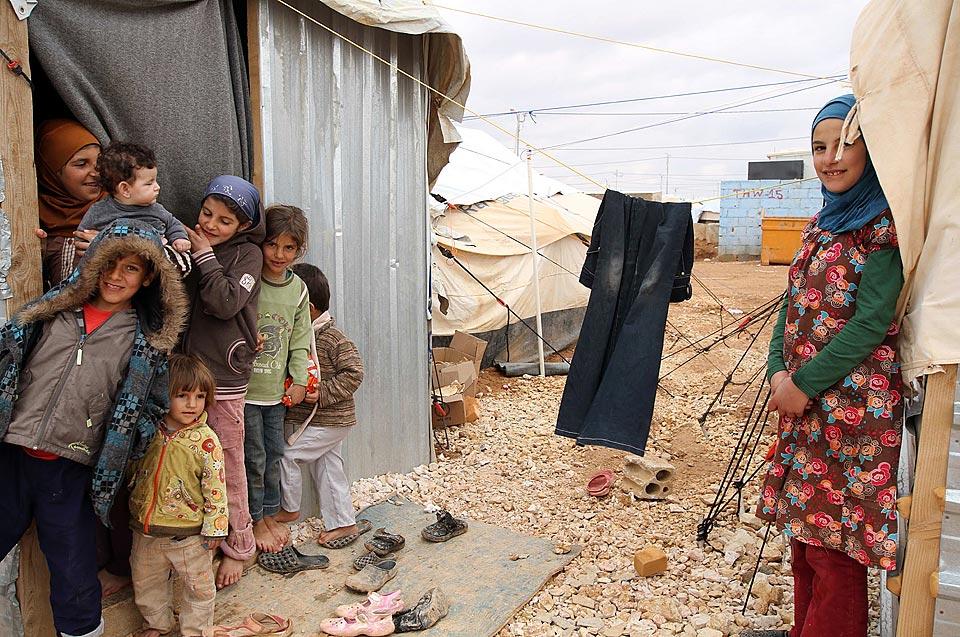Winterization Kits Make Camp Life “More Bearable” for Syrian Refugees

Children in the Zaâatri refugee camp play outside their newly installed winterized shelter. © A. G. Riisnes/NCA
LWF’s Gratitude for Generous Support from Churches and Partners
“We received the shelters during the rains, but before the snowfall. Our first night in the prefabricated shelter was the first night we felt safe and warm in Za’atri refugee camp,” Omm Yaser recalls, with tears welling up in her eyes.
Thanks to humanitarian support from The Lutheran World Federation (LWF) and other organizations collaborating with the United Nations High Commissioner for Refugees (UNHCR), the family of the 55-year-old mother and grandmother was protected from freezing and cold temperatures between December and March. They can sit together in the family’s “winterized room,” which is connected to the main prefabricated shelter attached to another four shelters, currently home to the household of more than 20 people.
Yaser’s family is among the 158,000 Syrians who were living at the Za’atri refugee camp in northern Jordan by mid-March. After two years of intensifying conflict at home, more than 1.2 million Syrian refugees are registered or awaiting registration in Jordan, Lebanon, Iraq, Turkey and Egypt, with new arrivals estimated at around 8,000 a day, according to the UNHCR. Another 3.6 million are displaced internally, the UN refugee agency says.
Through a program coordinated by its Department for World Service (DWS), the LWF has been providing relief and support for refugees at Za’atri camp in collaboration with the Jordanian government since August 2012. This included setting up 270 prefabricated shelters; equipping 2,200 tents each with winterization kits, cooking gas cylinders and an open porch; and distributing more than 33,000 sets of winter clothing.
An ACT appeal for financial support toward Syrian refugees had realized USD 1.96 million (over EUR 1.5 million) from LWF partners by the end of last year. An additional EUR 90,000 was received from one back donor, the Czech Republic, while congregations of the Evangelical Church of Czech Brethren (ECCB) gave more than EUR 10,000.
The ECCB is one of the two LWF member churches in the Czech Republic. It has 115,000 members in more than 250 congregations.
In a letter mid-March to the EECB Synod and the church’s moderator Rev. Joel Ruml, DWS director Rev. Eberhard Hitzler thanked the Czech church for its first-time contribution towards LWF’s work among Syrian refugees. “Your support is also a beautiful expression of the international solidarity that has characterized the work of LWF World Service since its very beginnings,” Hitzler wrote.
The LWF partners’ response has contributed to making the situation for especially women and children living in Za’atri camp “a little more bearable” during the harsh winter months, Hitzler said. Still, additional support will be required to respond to the deteriorating humanitarian crisis in Syria, characterized not only by widespread fighting and violence, but also by the breakdown of public order and loss of livelihoods for large sections of the population, he added.
Back at Za’atri camp, Yasser’s 30-year-old son Amjad is happy that the children have an alternative safe playing ground, thanks to LWF’s support. “We were always worried about the kids playing outside. The only outdoor spaces are basically in the street where camp vehicles are operating, making it dangerous for them to play. When we received the six prefabricated shelters, we arranged them to make an inner courtyard which became a safe playground for the children,” he explains.
LWF member churches contributing to the Syrian refugees’ appeal issued under ACT Alliance also include the Evangelical Lutheran Church in America, Church of Sweden, and Evangelical Lutheran Church in Bavaria (Germany). Support also came from the German Protestant aid agency Diakonie Katastrophenhilfe, DanChurchAid and United Church of Canada. The related agencies received government funding from Denmark’s international development agency DANIDA and the German Ministry for Foreign Affairs.
(LWF Jordan program staff contributed to this article.)

